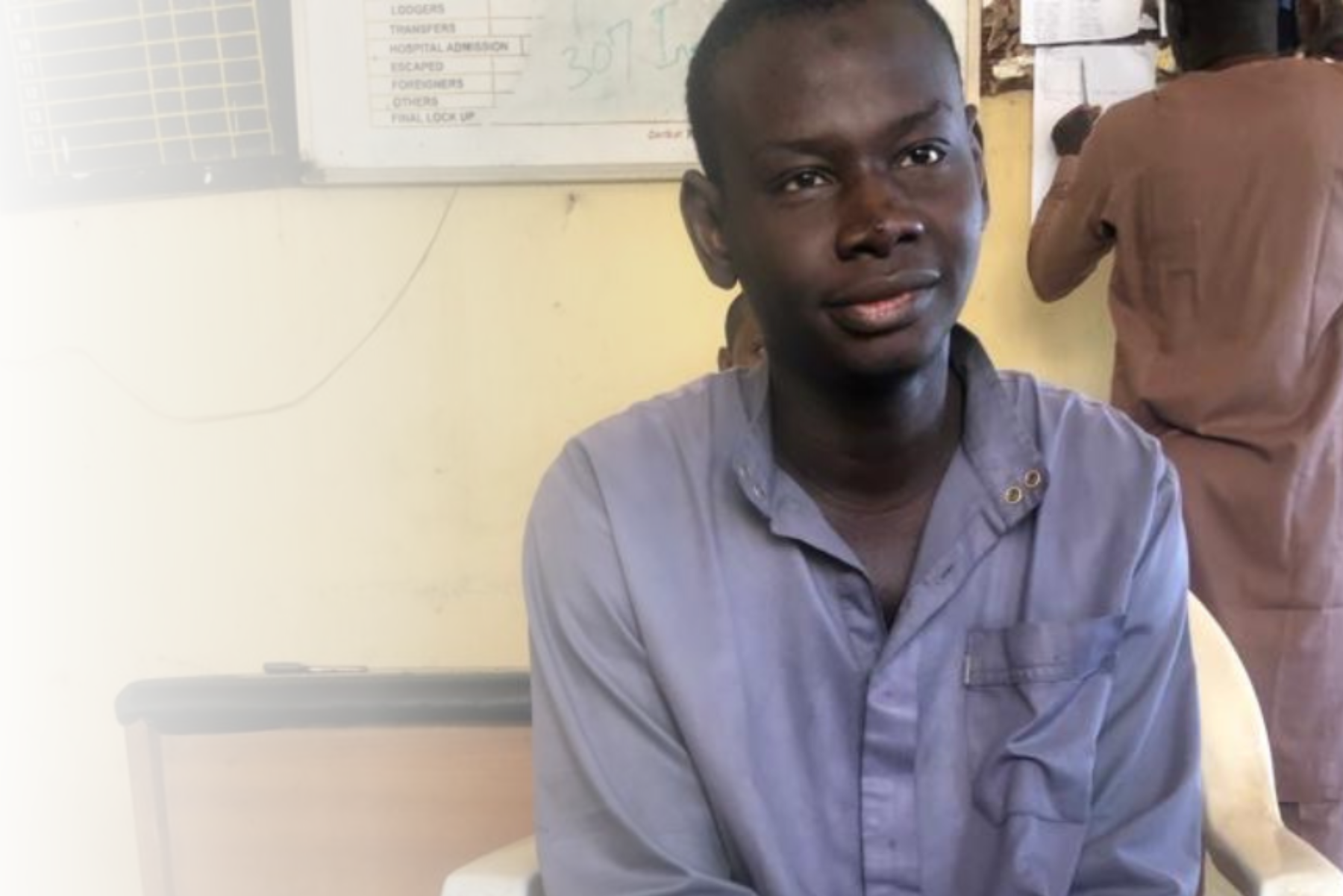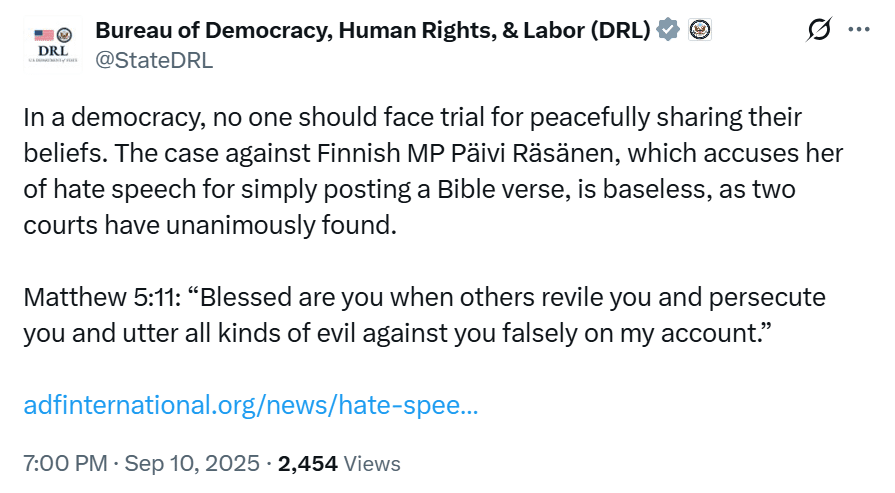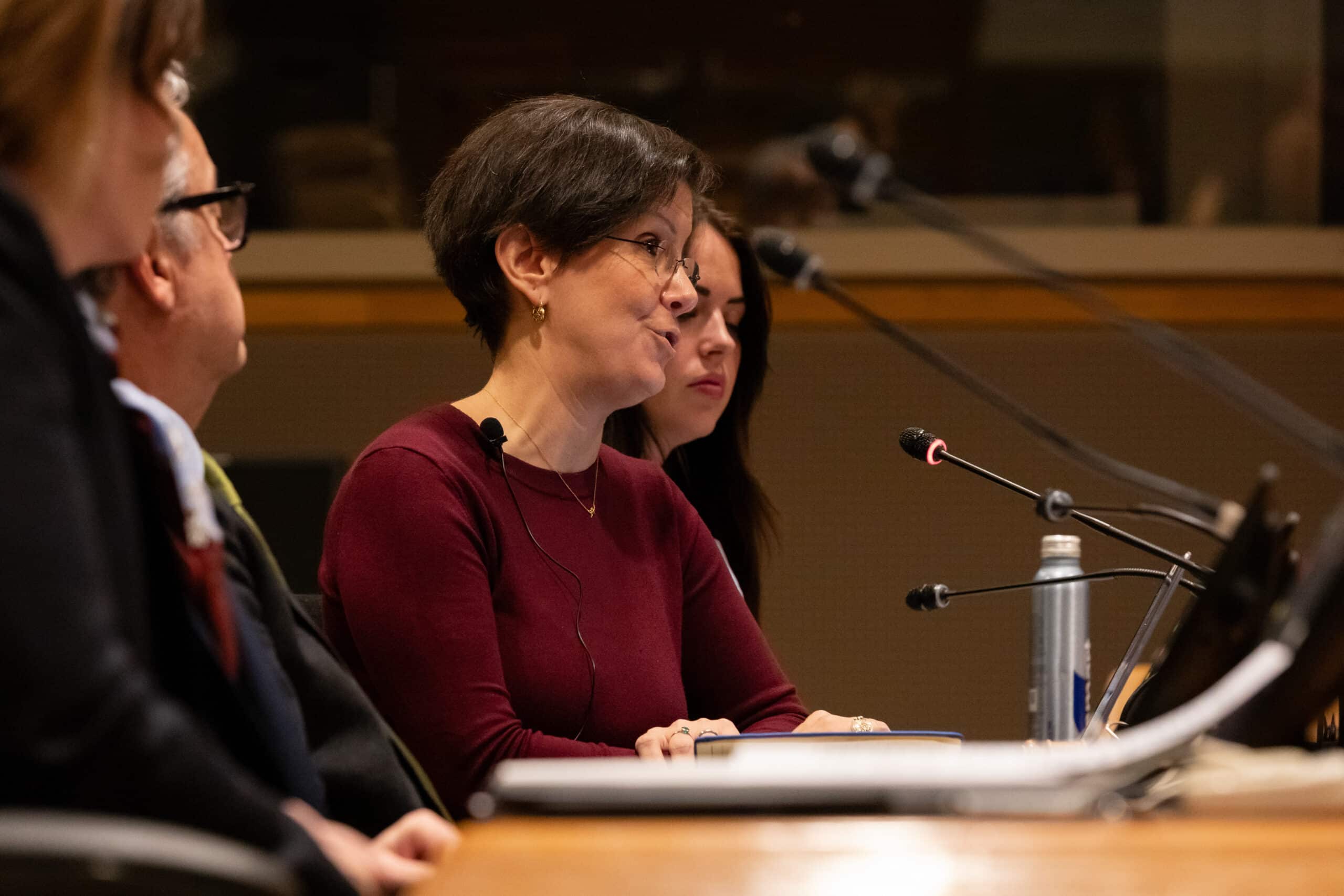Der Bayerische Verwaltungsgerichtshof entschied am 23. September, dass das Schwangerschaftskonfliktgesetz keine Bannmeile um Abtreibungskliniken vorschreibe, in der abtreibungskritische Meinungsäußerungen generell verboten seien. Damit bestätigte das Gericht den Beschluss des Verwaltungsgerichts Regensburg vom 14. August 2025, dass die monatlichen Gebetswachen von Helfer für Gottes kostbare Kinder Deutschland e.V. (Helfer Deutschland e.V.) bis zur endgültigen Entscheidung im Hauptsacheverfahren weiterhin wie gewohnt etwa 40 Meter vor einer Abtreibungseinrichtung stattfinden dürfen.
Lies weiterU.S. State Department: Arrest of Scottish Christian Grandmother is „Tyrannical”
- Christian grandmother arrested a second time; criminally charged for holding a sign reading “Coercion is a crime, here to talk, only if you want” within 200m of a hospital
- “The arrest of Rose Docherty is another egregious example of the tyrannical suppression of free speech happening across Europe”, warns U.S. State Department
GLASGOW (29 September 2025) – The U.S. State Department has expressed concern over the arrest of 75-year-old Rose Docherty, as seen in a viral video over the weekend.
The Glasgwegian grandmother has been criminally charged for holding a sign within 200m of the Queen Elizabeth University Hospital, reading:
“Coercion is a crime, here to talk, only if you want.”
In Scotland, “buffer zones” are enforced within 200m of every hospital, forbidding harassment, intimidation, and “influencing” of anyone seeking to access abortion services.
"The United States will always speak out against these violations of fundamental rights."
- U.S. State Department Spokesperson
Responding to the arrest, the U.S. State Department told the Telegraph:
“The arrest of Rose Docherty is another egregious example of the tyrannical suppression of free speech happening across Europe.
“When 75-year-old grandmothers are being arrested for standing peacefully and offering conversation, common sense and basic civility are under attack.
“The United States will always speak out against these violations of fundamental rights.”
Despite only having offered consensual conversation and not having approached any individual, nor making any statement on abortion – Docherty has been charged with breaching the “buffer zone.”
Reacting to her arrest, Rose Docherty said:
“Everybody has the right to engage in consensual conversation. I held my sign with love and compassion, inviting anyone who wants to chat, to do so – and stood peacefully, not approaching anyone.
“I should not be treated as a criminal for inviting people to chat with me – lending a listening ear. Conversation is not forbidden on the streets of Glasgow. And yet, this is the second time I have been arrested for doing just that.”
In August, Scottish authorities dropped their case against Docherty for holding the same sign in the same place after a global outcry against the 75-year-old grandmother’s arrest, including concerns raised in an online post by the U.S. State Department.
After her arrest this week, Docherty was held in custody for several hours. She was refused a chair to sit on in her cell, despite making it known that she had a double hip replacement.
Docherty has been charged and released on bail. Stringent bail conditions prevent her from attending an area marked out to be wider than the initial “buffer zone” area, in a move the legal team at ADF International call “disproportionate”.
Legal Counsel for ADF International, Lorcan Price commented:
“It’s deeply concerning that Scottish policing resources are being ploughed into arresting and prosecuting a peaceful grandmother offering to speak to people in public, rather than focusing on the problems caused by real crime in Glasgow.
“This is not a case about harassment, intimidation or violent protest – this is simply a grandmother, who held a sign offering to speak to anyone who would like to engage.”
The law’s architect, Gillian Mackay MSP, admitted on BBC Scotland earlier this year that the vague prohibitions in the buffer zones law could criminalise someone for praying visibly from a window in their home within the zone, “depending on who’s passing by the window.”
U.S. Vice President J.D. Vance highlighted this law as a particular matter for concern in his Munich Security Conference speech in February of this year.
Images for free use in print or online in relation to this story only
Pictured: Rose Docherty, Lorcan Price (ADF International)
Glasgower Großmutter erneut verhaftet wegen Gesprächsangebots in Abtreibungs-Bufferzone
- Christliche Großmutter zum zweiten Mal festgenommen und strafrechtlich verfolgt, weil sie ein Schild mit der Aufschrift „Nötigung ist strafbar, ich bin hier, um zu reden, wenn Sie möchten“ in weniger als 200 m Entfernung von einem Krankenhaus hielt.
- Die 75-jährige Rose Docherty musste in einer Polizeizelle zwei Stunden ohne Stuhl verbringen – obwohl sie beidseitig künstliche Hüftgelenke hat.
GLASGOW (27. September 2025) – Bereits zum zweiten Mal ist die 75-jährige Großmutter Rose Docherty verhaftet und angeklagt worden, weil sie innerhalb von 200 Metern des Queen Elizabeth University Hospital ein Schild hochhielt mit der Aufschrift:
„Nötigung ist strafbar, ich bin hier, um zu reden, wenn Sie möchten“
In Schottland gelten sogenannte „Buffer Zones“ im Umkreis von 200 Metern um jedes Krankenhaus. Innerhalb dieser Bereiche ist es verboten, Personen, die Abtreibungsdienste in Anspruch nehmen möchten, zu belästigen, einzuschüchtern oder in irgendeiner Form zu „beeinflussen“.
“Ich sollte nicht wie eine Kriminelle behandelt werden, nur weil ich Menschen zu einem Gespräch einlade und ihnen ein offenes Ohr schenke.“
- Rose Docherty
Obwohl sie lediglich stillstand, einvernehmliche Gespräche anbot und keine einzelne Person ansprach, wurde Docherty beschuldigt, die „Bufferzone“ verletzt zu haben.
Als Reaktion auf ihre Festnahme erklärte Rose Docherty:
„Jeder Mensch hat das Recht, einvernehmliche Gespräche zu führen. Ich hielt mein Schild mit Liebe und Mitgefühl hoch und lud alle, die sich unterhalten wollten, dazu ein – und stand friedlich da, ohne jemanden anzusprechen. Ich sollte nicht wie eine Kriminelle behandelt werden, nur weil ich Menschen zu einem Gespräch einlade und ihnen ein offenes Ohr schenke. Gespräche sind auf den Straßen Glasgows nicht verboten. Und dennoch wurde ich nun schon zum zweiten Mal genau dafür verhaftet.“
Bereits im August hatten die schottischen Behörden ein Verfahren gegen Docherty wegen desselben Schildes am selben Ort nach weltweiter Empörung eingestellt – unter anderem nachdem auch das US-Außenministerium in einem Online-Beitrag Bedenken geäußert hatte.
Nach ihrer jüngsten Festnahme wurde Docherty mehrere Stunden in Gewahrsam gehalten. Obwohl sie auf ihre beidseitige Hüftprothese hinwies, verweigerte man ihr in der Zelle einen Stuhl.
Sie wurde angeklagt und anschließend gegen Kaution freigelassen. Strenge Kautionsauflagen untersagen ihr den Zutritt zu einem Bereich, der größer abgesteckt ist als die ursprüngliche „Bufferzone“. Das Rechtsteam von ADF International bezeichnet diese Maßnahme als „unverhältnismäßig“.
Lorcan Price, Irischer Rechtsanwalt und Jurist bei ADF International, kommentierte:
„Es ist äußerst besorgniserregend, dass die schottische Polizei ihre Ressourcen darauf verwendet, eine friedliche Großmutter zu verhaften und strafrechtlich zu verfolgen, nur weil sie Menschen im öffentlichen Raum ein Gespräch anbietet – anstatt sich den Problemen zuzuwenden, die durch echte Kriminalität in Glasgow verursacht werden.
Hier geht es nicht um Belästigung, Einschüchterung oder gewalttätige Proteste – es geht einfach um eine Großmutter, die ein Schild hochhielt, auf dem stand, dass sie mit jedem reden würde, der Lust dazu hat.“
Die Initiatorin des Gesetzes, Gillian Mackay MSP, räumte Anfang dieses Jahres in einem Interview mit BBC Scotland ein, dass die vagen Formulierungen des “Schutzzonengesetzes” sogar dazu führen könnten, dass jemand strafbar wird, der in seinem Haus innerhalb der Zone sichtbar am Fenster betet – „abhängig davon, wer gerade am Fenster vorbeigeht.“
Der US-Vizepräsident J.D. Vance bezeichnete dieses Gesetz in seiner Rede auf der Münchner Sicherheitskonferenz im Februar dieses Jahres als besonderen Grund zur Sorge.
Bilder zur freien Verwendung im Zusammenhang mit dieser Geschichte, nur für den Druck oder Online.
Abgebildet: Rose Docherty, Lorcan Price (ADF International)
Nigerianischer Staatsanwalt will jungen Mann wegen WhatsApp-Lied öffentlich hinrichten lassen
- Nach mehr als fünf Jahren Haft fand vor dem Obersten Gerichtshof Nigerias die erste Anhörung im Blasphemiefall von Yahaya Sharif-Aminu statt; der Staatsanwalt erklärte: „Wir werden ihn öffentlich hinrichten.”
- ADF International unterstützt Yahaya in seinem Kampf um Gerechtigkeit und die Aufhebung der Blasphemiegesetze in Nigeria.
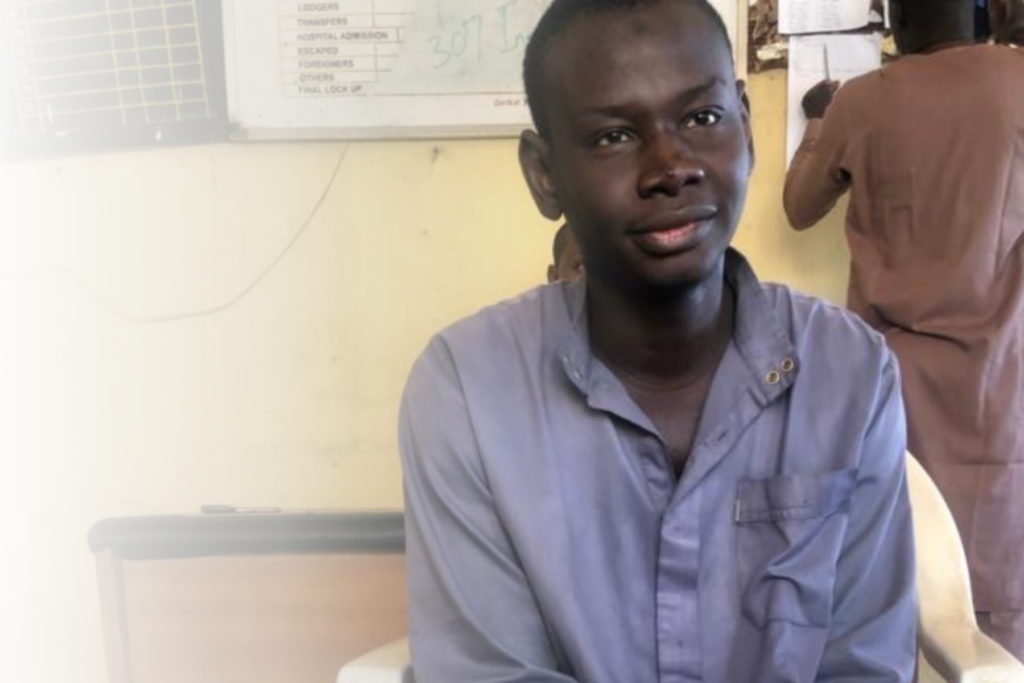
ABUJA (2. Oktober 2025) – Am 25. September fand vor dem Obersten Gerichtshof Nigerias die erste Anhörung im Fall des Sufi-Musikers Yahaya Sharif-Aminu statt. Ein Scharia-Gericht hatte ihn 2020 zum Tod durch Erhängen verurteilt, nachdem er beschuldigt worden war, angeblich „blasphemische” Songtexte auf WhatsApp geteilt zu haben. Dies stellt den ersten Schritt in seinem Berufungsverfahren vor dem höchsten Gericht des Landes dar – mehr als fünf Jahre nach seiner Inhaftierung. Der Oberste Gerichtshof ließ die Berufung von Sharif-Aminu zu.
Unmittelbar nach der Anhörung sprach Lamido Abba Sorondinki, Rechtsbeistand der Regierung des Bundesstaates Kano, ausdrücklich über die Absicht des Staates, Sharif-Aminu öffentlich hinzurichten, sollte der Oberste Gerichtshof zugunsten des Bundesstaates Kano entscheiden: „Dieser Antragsteller hat blasphemische Äußerungen gegen den Heiligen Propheten gemacht, die die Regierung des Bundesstaates Kano nicht dulden wird. Sollte der Oberste Gerichtshof die Entscheidung der Vorinstanz bestätigen, werden wir ihn öffentlich hinrichten. Diese erschreckende Aussage unterstreicht die extreme Strenge der Blasphemiegesetze im Norden Nigerias, die weiterhin das Leben religiöser Minderheiten bedrohen und die freie Meinungsäußerung unterdrücken.
„Vor dem Obersten Gerichtshof Nigerias liegt eine Frage von buchstäblich Leben oder Tod. Absolut niemand sollte bestraft, geschweige denn zu Tod verurteilt werden, weil er Songtexte friedlich geteilt hat.In einer gravierenden Verletzung seiner grundlegenden Menschenrechte hat Yahaya mehr als fünf Jahre im Gefängnis verbracht – allein wegen einer friedlichen WhatsApp-Nachricht.“
-Sean Nelson, Leitender Rechtsanwalt bei ADF International im Team für weltweite Religionsfreiheit
“Vor dem Obersten Gerichtshof Nigerias liegt eine Frage von buchstäblich Leben oder Tod. Absolut niemand sollte bestraft, geschweige denn zu Tod verurteilt werden, weil er Songtexte friedlich geteilt hat. In einer gravierenden Verletzung seiner grundlegenden Menschenrechte hat Yahaya mehr als fünf Jahre im Gefängnis verbracht – allein wegen einer friedlichen WhatsApp-Nachricht,“ sagte Sean Nelson, Rechtsanwalt bei ADF International im Team für weltweite Religionsfreiheit. “Die Anhörung vor dem Obersten Gerichtshof ist ein wichtiger Schritt, um ihm Gerechtigkeit zu verschaffen und sein Recht auf freie Meinungsäußerung zu schützen und damit auch das Recht jedes Einzelnen in Nigeria. Dieser Fall geht über einen einzelnen jungen Mann hinaus. Es geht darum, ob Millionen Nigerianer frei von Angst unter ungerechten Blasphemie Gesetzen leben können.”
„Viel zu lange wurden Blasphemie Gesetze unrechtmäßig dazu benutzt, religiöse Minderheiten zu verfolgen und zu schädigen. Es ist an der Zeit, dass das Gericht eine Entscheidung trifft, die das Recht auf Religionsfreiheit in Nigeria wahrt.“, sagte Kola Alapinni, internationaler Menschenrechtsanwalt und Rechtsbeistand von Yahaya Sharif-Aminu.
Hintergrund
Im März 2020 teilte Yahaya Sharif-Aminu, ein Sufi Musiker aus dem Bundesstaat Kano, auf WhatsApp Liedtexte, die von einigen als blasphemisch angesehen wurden. Die örtlichen Behörden verhafteten ihn, während ein Mob sein Haus niederbrannte. Am 10. August 2020 verurteilte ihn ein Scharia-Gericht wegen Blasphemie zum Tod durch Erhängen.
Im Januar 2021 hob das Gericht das Urteil aufgrund schwerwiegender Verfahrensfehler auf, darunter das Fehlen eines Rechtsbeistands während seines ursprünglichen Prozesses. Der Oberste Gerichtshof ordnete eine Neuverhandlung an, in der Sharif-Aminu erneut wegen Blasphemie mit der Todesstrafe rechnen musste. Nachdem ein Berufungsgericht die Anordnung der Neuverhandlung im Jahr 2022 bestätigte, legte Yahaya Sharif-Aminu Berufung beim Obersten Gerichtshof Nigerias ein.
Sharif-Aminu befindet sich seit über fünf Jahren in Haft und wartet derzeit auf ein Urteil des Obersten Gerichtshofs. In seiner Berufung fordert Sharif-Aminu das Gericht nun nicht nur auf, ihn freizulassen, sondern auch das Gesetz des Bundesstaates Kano zur Todesstrafe für Blasphemie für verfassungswidrig zu erklären, da es gegen die nigerianische Verfassung und internationale Verpflichtungen zum Schutz der Religions- und Meinungsfreiheit verstoße.
Blasphemiegesetze in Nigeria
Die Blasphemiegesetze Nigerias, die insbesondere im Norden des Landes streng durchgesetzt werden, sehen schwere Strafen bis hin zur Todesstrafe vor. Internationale Menschenrechtsorganisationen haben wiederholt ihre Aufhebung gefordert. Der Fall Yahaya vor dem Obersten Gerichtshof unterstreicht die dringende Notwendigkeit einer Reform zum Schutz der Religions- und Glaubensfreiheit.
Der Berufungsfall von Yahaya vor dem Obersten Gericht könnte wegweisend sein: Er hat das Potenzial, die Blasphemie-Gesetze in Nordnigeria zu ändern. Das würde nicht nur christliche Konvertiten und muslimische Minderheiten, sondern auch viele andere besser vor der oft lebensgefährlichen Gewalt schützen, die mit Blasphemie-Anklagen einhergeht – und ihnen mehr Freiheit geben, ihren Glauben offen zu leben.
Mittlerweile hat das Europäische Parlament bereits zweimal die Freilassung Yahayas gefordert und dazu jeweils eine Dringlichkeitsentschließung, (urgency resolution) verabschiedet. Es ist ungewöhnlich, dass ein Fall zweimal behandelt wird, was den Ernst und die Wichtigkeit der Situation von Yahaya unterstreicht. Die Arbeitsgruppe der Vereinten Nationen für willkürliche Inhaftierungen hat ebenfalls festgestellt, dass Yahayas Inhaftierung gegen international anerkannte Menschenrechte verstößt. Anfang dieses Jahres entschied das regionale westafrikanische Vertragsgericht, der ECOWAS-Gerichtshof, dass die Blasphemiegesetze Nigerias gegen das Völkerrecht und die Afrikanische Charta verstoßen, und forderte die Aufhebung der Blasphemiegesetze. Der ECOWAS-Gerichtshof stützte
US State Department Panel Decries Censorship at UN High-Level Week
- Free speech experts raise concerns about the rise of free speech violations across Europe and UK to the UN
- ADF International’s Kelsey Zorzi underscores global threats to free speech, citing EU Digital Services Act.
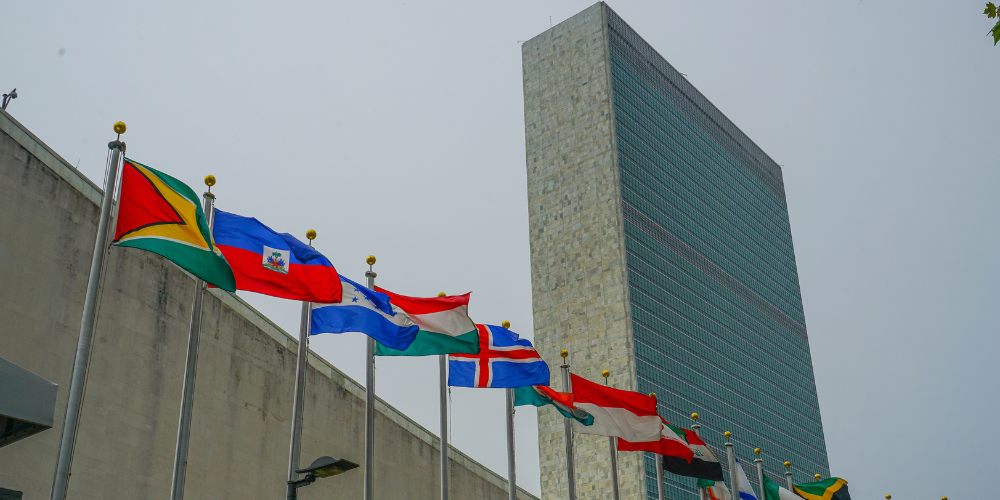
NEW YORK CITY (Sept 25) – In a significant show of concern, the U.S. State Department hosted a panel discussion at United Nations High-Level week on Thursday. Experts addressed rising global censorship, highlighting the UK and Europe. Kelsey Zorzi, Director of Advocacy for Global Religious Freedom with ADF International, highlighting growing threats to free speech across the world.
“With hundreds of active cases in dozens of countries across six continents, we have a unique vantage point from which a clear picture has emerged: censorship is becoming more aggressive, more coordinated, and more global,” said Zorzi.
“Censorship is becoming more aggressive, more coordinated, and more global."
- Kelsey Zorzi, Director of Advocacy for Global Religious Freedom at ADF International
The panel, on the margins of the UN High-Level Week before the 80th Session of the General Assembly, follows a hearing before the House Judiciary Committee of the US Congress, where ADF International similarly warned US lawmakers of the threat of censorship growing across Europe.
Escalating Censorship Across the World
Zorzi described the state of censorship in the EU as “highly concerning.” She highlighted the case of Päivi Räsänen, a sitting Finnish Parliamentarian facing criminal prosecution for tweeting a Bible verse, now before Finland’s Supreme Court. ADF International is coordinating Rasanen’s legal defence.
Another major concern raised was the reality that Europe is exporting censorship worldwide through the EU Digital Services Act (DSA), including to the United States.
Zorzi stated the following on the censorial impact of the DSA:
“The DSA is a brazen attempt to create a global Censorship Industrial Complex, not only for the EU but for the entire digital world. It is imposed on all platforms used by Europeans, regardless of where those companies are based. Any content found objectionable under EU rules may be banned everywhere.
“While EU regulators have denied that the DSA promotes censorship within Europe or abroad, just this week, in response to investigations carried out by the U.S. House Judiciary Committee, the internet giant Google expressed its own concerns that ‘the DSA may pose [risks] to freedom of expression within and outside of the European Union.’
“We’ve also already seen just how far governments will go in censoring online speech, and there is no reason to believe that EU regulators wielding the enormous bureaucratic power of the DSA would have any more restraint.
“The UK already arrests 12,000 people every year—over 32 people a day—for allegedly offensive online posts. The Brazilian Supreme Court has recently held that digital platforms like X should be held directly liable for posts allegedly constituting “hate speech” if they are not removed, a decision that has led, in part, to the U.S. placing sanctions on Brazilian officials. EU officials have previously even threatened X with massive fines merely for hosting a conversation with then-Presidential candidate Donald Trump.
“In a similar manner to the EU, the UK has embarked on the path of online censorship with the introduction of the so-called ‘Online Safety Act’ which is already being used to censor perfectly legitimate political speech as ‘illegal content’, like the EU’s Digital Services Act the UK’s Online Safety Act gives government regulators power to impose enormous fines on tech companies- which leads to a compliance mindset.”
Zorzi called on governments to take action, stating that, “While the current EU censorship landscape is highly concerning, the weeks ahead are critical, as the DSA comes under mandatory review this November. Many European leaders already have a vice grip on the global public square. Nations and organizations that support free speech anywhere must push back now before that vice grip becomes a chokehold.”
„Lebensschutz ist Staatsauftrag“ – Menschenrechtsexperte Felix Böllmann spricht beim Marsch für das Leben in Köln
Beim diesjährigen Marsch für das Leben in Köln trat am Sonntag Felix Böllmann, Rechtsanwalt und Leiter der Rechtsabteilung bei ADF International in Wien, als einer der Hauptredner auf. In seiner Ansprache vor ca. 2.000 Teilnehmern betonte Böllmann die grundlegende Bedeutung des Lebensrechts und rief zum gesellschaftlichen Einsatz für den Schutz des menschlichen Lebens auf – besonders dort, wo es am verletzlichsten ist.
Lies weiterDie lang erwartete Anhörung im Fall des nigerianischen Häftlings, der wegen einer WhatsApp-Nachricht zum Tode verurteilt wurde, ist angesetzt.
Eine Anhörung im Berufungsverfahren von Yahaya-Sharif Aminu findet am Donnerstag vor dem Oberste Gerichtshof Nigerias statt
Lies weiterUS State Department Speaks Out in Support of Parliamentarian Prosecuted for Bible-Verse Post: “In a Democracy, No One Should Face Trial for Peacefully Sharing Their Beliefs”
A US State Department bureau said on Wednesday that the criminal prosecution of Finnish MP Päivi Räsänen “is baseless” and tweeted a Bible verse in support.
Lies weiterUN-Expertin: Verleumdung von Eltern, die ihre Kinder vor geschlechtsverändernden Eingriffen schützen wollen, ist „beunruhigend“
Reem Alsalem, UN-Sonderberichterstatterin für Gewalt gegen Frauen und Mädchen, setzt sich für Eltern ein, die aufgrund ihrer Bedenken hinsichtlich der „Geschlechtsumwandlung“ ihrer Kinder „verleumdet, ausgegrenzt oder sogar von ihren Kindern getrennt“ wurden.
Lies weiterBrazilian Mother Denied Right to Homeschool Despite International Law
- Brazilian state court ruled against Regiane Cichelero, a mother who sought to homeschool her son.
- ADF International decries the decision as a violation of international human rights law protecting parental rights in education.
- Brazilian state court ruled against Regiane Cichelero, a mother who sought to homeschool her son.

Santa Catarina, BRAZIL (September 4, 2025) — The highest court in the state of Santa Catarina denied the right of Brazilian mother Regiane Cichelero to homeschool her son, ruling that he must be enrolled in an officially accredited school. The decision also upholds financial penalties against her, totaling around $20,000 USD. Regiane will appeal the decision and bring the case to the highest court in the nation.
“This decision is a disappointing setback for parental rights in Brazil. International human rights law is clear: parents have the right to choose the kind of education their children receive. By deciding that Regiane cannot homeschool her son, the court has not only failed her family but also undermined protections for all parents across Brazil"
- Julio Pohl, Legal Counsel for Latin America at ADF International
“This decision is a disappointing setback for parental rights in Brazil,” said Julio Pohl, legal counsel for Latin America at ADF International, which coordinated Cichelero’s legal defense. “International human rights law is clear: parents have the right to choose the kind of education their children receive. By deciding that Regiane cannot homeschool her son, the court has not only failed her family but also undermined protections for all parents across Brazil.”
Cichelero began homeschooling her son in 2020 after schools closed during the COVID-19 pandemic. When schools reopened, she chose to continue home education, believing it to be the best way to provide quality instruction consistent with her family’s religious values.
In response, local authorities fined her heavily and threatened to remove her son from her custody if she did not comply with state schooling mandates. With today’s ruling, the court has rejected her appeal and imposed compulsory school enrollment.
Background
Over 70,000 children are currently homeschooled in Brazil. International human rights law protects the rights of parents to make choices concerning the type of education their children receive.
Article 26.3 of the Universal Declaration of Human Rights states that “parents have a prior right to choose the kind of education that shall be given to their children.” In addition, Article 13 of the International Covenant on Economic, Social and Cultural Rights requires states to respect the right of parents “to choose for their children schools, other than those established by the public authorities, which conform to such minimum educational standards as may be laid down or approved by the State and to ensure the religious and moral education of their children in conformity with their own convictions.”
Following today’s decision, Cichelero said: “It is heartbreaking to be told that I cannot provide my son with the education I know is best for him. The state’s decision not only punishes me with heavy fines but also strip me of the ability to raise my child according to my convictions. No parent should have to fear punishment for choosing the best education for their child.”






